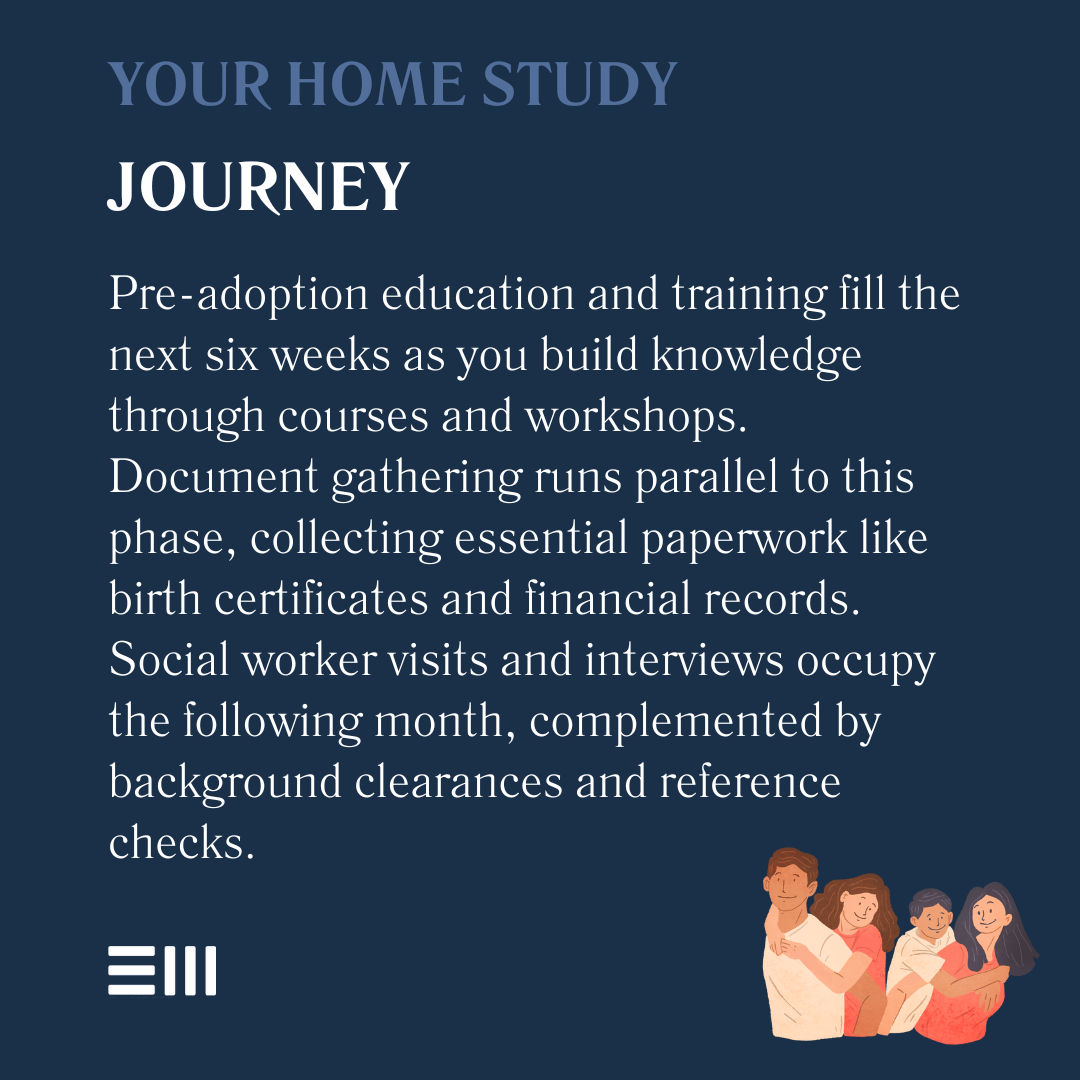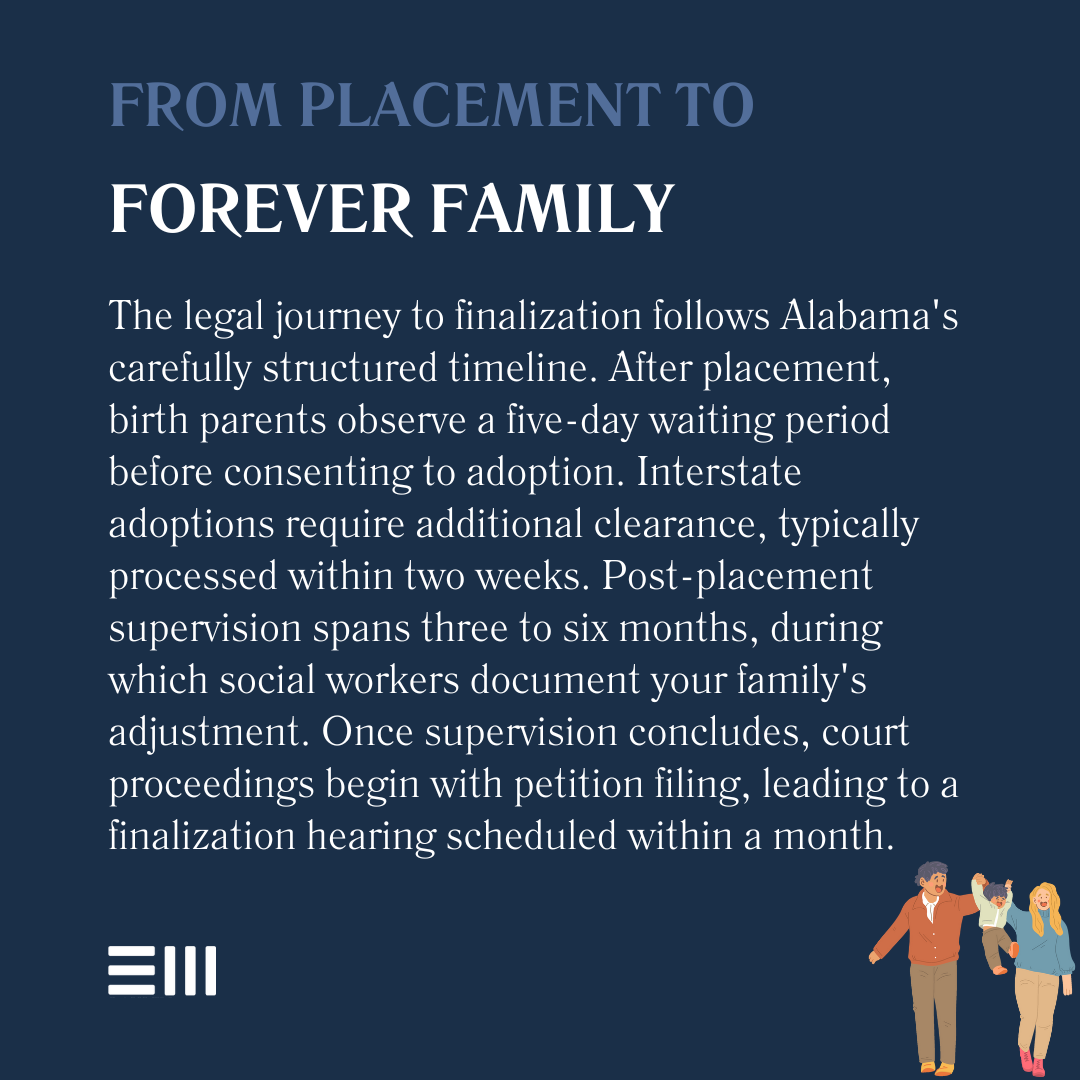From the gentle hills of Huntsville to the coastal breezes of Mobile, Alabama, families embracing adoption share a common question: "When will we hold our child?"
While each family's journey unfolds at its own pace, understanding the timeline helps transform waiting into purposeful preparation.
Through the experiences of hundreds of Alabama families, we've learned that the path to adoption moves through clear, manageable phases, each bringing you closer to welcoming your child home.
The journey may span months or years, but every step moves purposefully toward building your forever family.
Initial Consultation to Home Study Completion
The first phase of your adoption journey sets the foundation for success. This period involves gathering documentation, completing training, and working with social workers to prepare your home and family.
Understanding each step helps you navigate this phase efficiently and thoroughly.
Key steps in this phase include:
- Agency selection and initial paperwork (2-4 weeks): Researching agencies, comparing services, completing application forms, and submitting initial documentation.
- Pre-adoption education and training (4-6 weeks): Attending required courses, completing online modules, and participating in workshops covering adoption essentials.
- Home study document collection (3-6 weeks): Gathering birth certificates, marriage licenses, financial statements, medical clearances, employment verification, and reference letters.
- Social worker visits and interviews (2-4 weeks): Participating in individual and family interviews, home safety assessments, and lifestyle discussions.
- Background clearances and references (2-3 weeks): Completing FBI fingerprinting, state background checks, child abuse clearances, and professional reference verification.
- Home study report preparation (2-3 weeks): Review and approval of the final home study document, including any necessary revisions.
Most Alabama families complete their home study within 3-4 months, though motivation and preparation can accelerate this timeline.
Organization and prompt document submission often help families move through this phase more quickly.
Matching Process Timeline
The matching phase varies significantly based on your adoption preferences and the type of adoption you pursue.
Understanding these variables helps set realistic expectations and prepare for the waiting period effectively.
Factors affecting matching time include:
- Age preferences for the child: Newborn to teenager considerations;
- Openness to special needs: From minor medical issues to more significant challenges;
- Race and ethnicity considerations: Understanding transracial adoption implications;
- Geographic limitations: In-state vs. out-of-state placements;
- Birth parent preferences: Level of ongoing contact and relationship;
- Type of adoption (domestic, international, foster): Each path's unique timeline;
- Legal risk comfort level: Openness to various legal situations;
- Budget considerations: Financial resources and constraints;
- Gender preferences: Impact on waiting time;
- Sibling group openness: Possibilities for multiple child adoption;
- Medical history comfort levels: Acceptance of various health backgrounds; and
- Cultural considerations: Understanding and preserving heritage.
Typical matching timeframes range from 2-18 months, with most families matched within 6-12 months. Your specific preferences and flexibility significantly influence this timeline.
Legal Process and Finalization
Alabama's legal adoption process follows specific timelines established by state law. Knowing these requirements helps families plan effectively and understand the necessary steps toward finalization.
Legal milestones include:
- Consent waiting periods (5 days after birth): Alabama law's mandatory waiting period;
- Interstate Compact clearance (5-10 business days): Required for out-of-state adoptions;
- Post-placement supervision (3-6 months): Regular visits and progress reports;
- Court petition filing (after supervision): Preparation of legal documentation;
- Finalization hearing scheduling (2-4 weeks): Court calendar coordination;
- Final decree issuance (same day as hearing): Legal completion of adoption;
- Birth certificate amendment (4-6 weeks): Updated documentation;
- Social security card updates (2-3 weeks): Identity documentation;
- Passport application process (if needed): International travel preparation; and
- State benefit adjustments: Subsidy and support modifications.
The entire legal process typically takes 4-8 months from placement to finalization, depending on court schedules and document processing times.
Special Circumstances and Variables
Various factors can impact your adoption timeline in Alabama. Understanding these potential variables helps families prepare for different scenarios and maintain realistic expectations throughout the process.
Common timeline variables include:
- Birth parent counseling needs: Supporting informed decisions;
- Interstate adoption requirements: Coordinating between states;
- International program changes: Policy updates and requirements;
- Court scheduling delays: Calendar and staffing impacts;
- Document processing times: Agency and government timeframes;
- Agency staffing levels: Resource availability;
- Holiday court closures: Seasonal scheduling impacts;
- Weather-related delays: Natural events affecting timelines;
- Medical clearance requirements: Health documentation needs;
- Translation services: International document processing;
- Cultural ceremony incorporation: Traditional practices; and
- Travel coordination: Domestic and international arrangements.
Flexibility and understanding help families navigate these variables successfully. Maintaining open communication with your adoption team ensures smooth handling of unexpected developments.
Expedited Options and Considerations
Some situations may allow for faster adoption timelines, though expedited processes require careful consideration of all factors involved. Understanding these options helps families make informed decisions about their adoption path.
Expedited possibilities include:
- Special needs adoption programs: Priority placement opportunities;
- Identified adoption situations: Pre-matched circumstances;
- Foster-to-adopt opportunities: Existing relationship transitions;
- Emergency placement needs: Urgent situation response;
- Kinship adoptions: Family member placements;
- Last-minute placement situations: Unexpected availability;
- Waiting child programs: Currently available children;
- International pilot programs: New country opportunities;
- Agency priority placements: Specific situation matching; and
- Medical needs expedited process: Specialized care requirements.
Each expedited option carries unique considerations that families should evaluate carefully with their adoption professional's guidance.
Frequently Asked Questions About the Adoption Process in Alabama
Prospective adoptive parents often have specific questions about adoption timelines in Alabama.
Here are detailed answers to common timing concerns that help families better understand their adoption journey.
What Makes Some Adoptions Take Longer than Others?
Various factors influence timeline length, including family preferences, legal requirements, and birth-parent situations. Flexibility in preferences often correlates with shorter wait times. Agency resources, court schedules, and document processing can also impact overall timelines.
How Can We Best Use Our Waiting Time?
The waiting period provides opportunities for preparation, including home preparation, educational courses, support group participation, and relationship building with your adoption team.
Many families use this time to learn about their child's culture, develop support networks, and prepare extended family members.
Do International Adoptions Take Longer than Domestic?
International adoption timelines vary significantly by country, ranging from 12-36 months. Each country maintains unique requirements and processing schedules.
Factors like travel requirements, document authentication, and embassy processing affect overall timelines.
What Impact Does Age Preference Have on Timeline?
Generally, openness to older child adoption or sibling groups can reduce waiting time, while requesting only infants may extend the process. Age preferences also influence the type of preparation and training required for families.
How Do Birth Parent Rights Affect Timing?
Alabama law provides specific timeframes for birth parent rights and revocation periods, which impact overall adoption timelines. Understanding these legal requirements helps families prepare for potential waiting periods and uncertainties.
Building Your Path to Family
Your adoption journey deserves experienced guidance to navigate timelines effectively. Our team understands Alabama's adoption landscape and provides comprehensive support through each phase of the process, ensuring you never face uncertainty alone.
Contact us to begin your journey.
Let us help you navigate your path to building your family. Together, we'll create a timeline that works for your unique situation while maintaining focus on the ultimate goal: creating your forever family.


